Our house was in a lane of Behari Sao Lane, Bankipur in Patna.
Our Dadu ( grandfather) Shri Adhar Chandra, was a gentleman of great gravitas. He looked like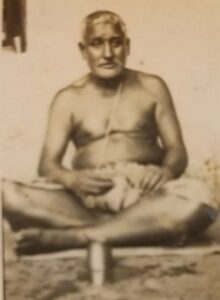 ‘Lahiri Mahasaya’, the great saint of Benaras. He was an officer in the Telegraph office, Govt. of India, around 1930. On transfer, he landed in Patna and had postings in Lahore, Peshawar etc. He settled in Patna on retirement. Locally, amongst the Bihari populace, our Dadu was known as ‘Taar Babu’ as the ‘telegraph’ was called in that era. On the ground floor of his house, there was a big room known as ‘Bara Ghar’. There was a big solid table on which there used to be a telephone and a Morse code implement. This was Dadu’s working table at home.
‘Lahiri Mahasaya’, the great saint of Benaras. He was an officer in the Telegraph office, Govt. of India, around 1930. On transfer, he landed in Patna and had postings in Lahore, Peshawar etc. He settled in Patna on retirement. Locally, amongst the Bihari populace, our Dadu was known as ‘Taar Babu’ as the ‘telegraph’ was called in that era. On the ground floor of his house, there was a big room known as ‘Bara Ghar’. There was a big solid table on which there used to be a telephone and a Morse code implement. This was Dadu’s working table at home.
This house was on rent initially and our father Dr. Nolin Behari purchased it from Sri Beni Madhav (Khurana Babu) subsequently, at a cost of ₹4000. There were two rooms on the ground floor, ‘Pisimar Ghar’ and ‘Bharnar Ghar’ (ভাঁড়ার ঘর). In my school days around 1947, Mother used to live in ‘Bharnar Ghar’, which in earlier days was a store room with big containers for grains. There were two rooms on the first floor, a verandah, two roofs, known as ‘Bara Chaat’ and ‘Chhoto Chhaat’. In the front room on the first floor, Dadu used to live. Our Thakuma (grandmother) had gone to heaven a long time back. Our father, being a District Board doctor of Bihar Govt, was mostly in North Bihar on duty, and used to visit the family from time to time. Later Barda (elder brother) and Baraboudi lived in Dadu’s Ghar, till Barda got an accommodation in the Governor House quarters. He was a good surgeon and personal physician to M.S. Aney, Governor of Bihar. Dada and Mejoboudi used to live in Dadu’s ghar for long years till they shifted to their own house in Rajendra Nagar. Mejokaka and Notun Masima used to stay in the other room on first floor for long years, till they also shifted to their own house on Govinda Mitra Road.
In Bara Bairer Ghar, there was a big white dome hanging from the ceiling with an electric bulb, which looked majestic. Dadu’s big work table, I had converted into a table-tennis table, complete with a net, where we brothers used to play with a lot of excitement. Still later, I understand Bachchu made it into a dining table, placed in ‘Bharnar Ghar’. There was a ‘Ferranti Radio’ in Dada’s room, with a speaker placed on a shelf near the end of the stairs. Dada had fallen down the stairs once, before marriage. I used to climb down the stairs in my school days. Sometimes, without using the stairs, like Spider-man!!
There was a kitchen adjacent to the ‘Bhanrar Ghar’ (ভাঁড়ার ঘর). The bathroom for the ladies was a small one, and we the big men would take bath from a water-tank (chaubachcha, চৌবাচ্চা). Next to it was the only tap in the house, with plenty of water. The water was clean and good. In summer days, I understand, Papu (nephew) had made a swimming pool out of this ‘chaubachcha’. I had seen Choto Thakuma of ‘Bhattacharjee Bari’, coming out of it after cooling herself. She was very dominating and used to address our father as ‘Tota’. This must have been his nickname!
There was a main door in the house and a ‘khirki darja’. ‘Choto Bairer Ghar’ was our drawing room, which was adorned with sofas after Sejda’s marriage. Before that, there was only an ‘Aaram Kedara’(easy chair) There Bhaktada, Dada’s Friend, a professor of History, would sit comfortably and mesmerize us with his stories. Dada had rich and fashionable friends, who would come to our house often with family. Barda would come sometimes, in this car and Baraboudi would give ‘Marai’, our servant, a handful of coins from her purse, like a queen! These were the halcyon days.
After the marriage of Barda, there was much laughter and mirth in the house. Baraboudi took charge of us brothers who were quite small then, our dress and behaviour. We addressed 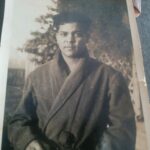 each other as Tui. We learnt to address as ‘Tumi,’ she would feed us together four or five at a time from a single big plate, along with interesting stories. She told us a lot about Iran, the King and Queen, herself driving a Jeep there and the adventurous life she had before marriage.There in Iran, when Barda was on duty during 2nd World War, he came across a Bengali girl, Nilima Choudhury in a foreign land, daughter of a Petroleum Engineer. He fell headlong in love and the outcome was our Bara Boudi. She brought in fresh air, modernity and a cheer to the house, won everybody’s heart in our family and even braved the Lion of the House, our Baba.
each other as Tui. We learnt to address as ‘Tumi,’ she would feed us together four or five at a time from a single big plate, along with interesting stories. She told us a lot about Iran, the King and Queen, herself driving a Jeep there and the adventurous life she had before marriage.There in Iran, when Barda was on duty during 2nd World War, he came across a Bengali girl, Nilima Choudhury in a foreign land, daughter of a Petroleum Engineer. He fell headlong in love and the outcome was our Bara Boudi. She brought in fresh air, modernity and a cheer to the house, won everybody’s heart in our family and even braved the Lion of the House, our Baba. 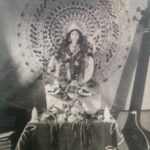 During conversation, I have heard her arguing with him. ‘Hather Paanch Aangul to Soman Hoina’ (হাথের পাঁচটা আঙুল তো সমান হয়না) while sweeping the floor in Bara Ghar. She would take homeopathic pills from all bottles from a Homeo-box, gulp them. Of course not in front of father! Saraswati Puja was a regular event every year in Bara Ghar, with a lot of decoration and devotion. Mejokaka, once given duty, brought a very small ‘Saraswati Thakur’( idol) hidden under his’ wrapper’ by the Khirki Darja. We were all disappointed. Later bigger and bigger Saraswati Thakur used to come and the immersion took place in mid Ganga under the leadership of Bachchu.
During conversation, I have heard her arguing with him. ‘Hather Paanch Aangul to Soman Hoina’ (হাথের পাঁচটা আঙুল তো সমান হয়না) while sweeping the floor in Bara Ghar. She would take homeopathic pills from all bottles from a Homeo-box, gulp them. Of course not in front of father! Saraswati Puja was a regular event every year in Bara Ghar, with a lot of decoration and devotion. Mejokaka, once given duty, brought a very small ‘Saraswati Thakur’( idol) hidden under his’ wrapper’ by the Khirki Darja. We were all disappointed. Later bigger and bigger Saraswati Thakur used to come and the immersion took place in mid Ganga under the leadership of Bachchu.
Continuing with the details of the house, there was a long verandah, on the ground floor, where we would sit on the floor for our meals. Either there were wooden planks or ‘Asans’. It was a pastime or hobby those days for ladies of the house to make those ‘Asans’ out of colourful threads with various designs.
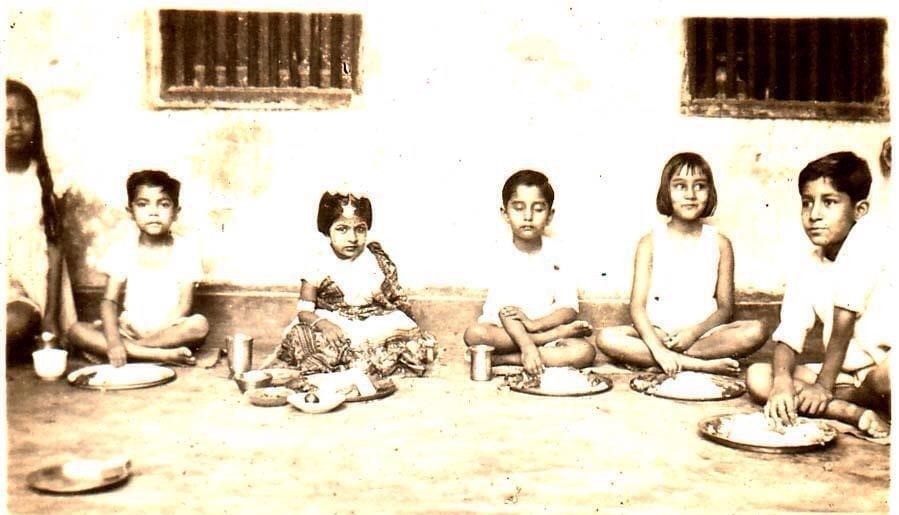
When Dadu was alive, he used to perform Puja daily on this verandah with ‘kosa, kusi’ etc. There were four Victorian style round pillars at the end of this verandah to support the first floor verandah. Then at right angles to these pillars were wooden pillars to support the ‘Chhoto Chhaat’. While taking a meal, there was a strict code of conduct, the seating order would follow the seniority of the person. And in the day time while having meals somebody would have to fan the seniors, along with the job of serving them. Our hands would ache, but we had to do the job.
In the center of the house, there was a courtyard though not a big one, where ‘Bhutta Babaji’, our professional cook, with his assistants would prepare big meals on the occasion of marriages and ‘Upanayan’(thread ceremony). He was a Maithili Brahmin, good looking and always smiling. His preparations were superb. Guests were served their meals on the first floor verandah, in two rows facing each other.
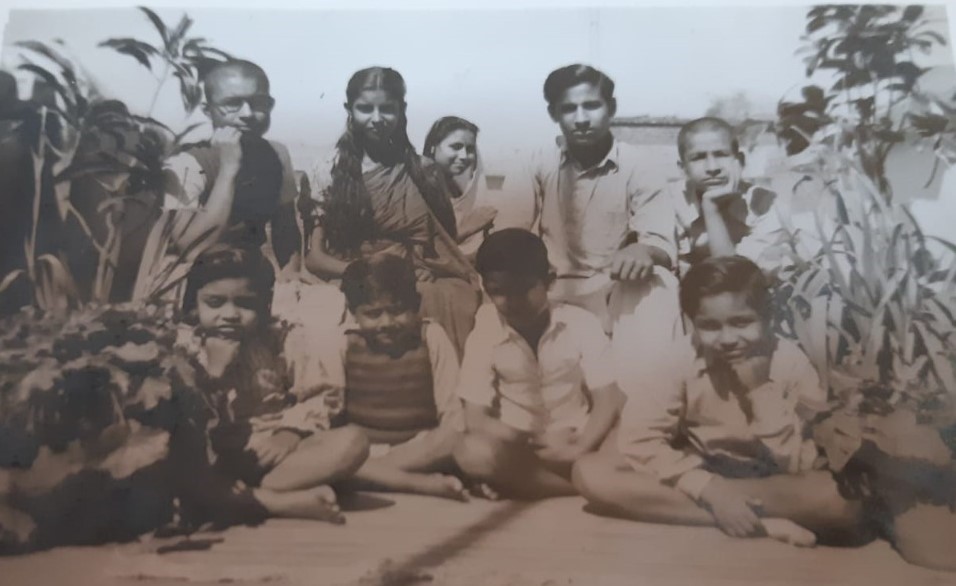
I learnt to cycle on the verandah. The first floor ‘verandah’ was also our practice ground for football. I remember Dada shooting and myself keeping goals. Normally I could catch most of the balls. Those were my school days. In later years, I played for the school team and the School of Mines Team as Goalkeeper for four years. So the grounding was good for me on the first floor ‘verandah’.
We used to have our home productions of cultural programmes as well in this spot. Chhoto Chhaat and Bara Chhaat were our playgrounds for pebbles and kite flying. In a corner near ‘Bara Chhaat’, we would make ‘Gharonda’ every year during Diwali. It used to be a small house made of clay with doors, windows, and staircase, complete with colours and decoration. There would be a small puja and Prasad distributed on Diwali night with safest fireworks displayed later on the Bara Chhaat. Being on the Bara Chhaat was a great pleasure for all of us, opening us up to the sky, experiencing the first rains on our bare bodies. We could watch the moon and the stars, trying to identify the ‘Saptarshi’ (Great Bear), or the planets Venus, Mars or the Pole Star; to distinguish between a star and a planet. The moving clouds with changing shapes in the daytime were fascinating. Sometimes, an elephant or a dog or even a crocodile appeared in the clouds! I think Dada initiated us into appreciating the clouds. The fleeting clouds were a beauty. On winter days, the sky was full of kites, many with tails.
Most of the houses in our locality had thatched roofs covered by tiles and they were very fire-prone in the summer-heat. Many a time we could watch raging fires in such houses during the night time from Bara Chhaat. They looked dangerous and scary. Our house too was at such a risk. In fact during 1957-1958, a portion of our house caught fire as some fellow from the guest house in our neighboring building threw a left over cigarette, through the window.
Subsequently tragedy struck our family. While Barda was posted at Giridih, I decided to pay him a visit from Dhanbad where I was studying at the Indian School of Mines. And as I reached Barda’s Bunglow, I was shell shocked to know that he was no more. Barda was the most loved person and personality in our area and suddenly he left us – all was lost. Nobody knows God’s designs. That I had gone to Giridih suddenly on the eventful day was also a great coincidence. Thus ended a glorious chapter in the Mukherjee family and suddenly we became poor financially and emotionally.
Barda was the apple of the eye of the Mukherjee family. He was our role-model. Very fair, handsome and very healthy, sporting, humorous, a big hearted man, he was a fountain of joy for all of us. As we brothers slept, he would surprise us in the early mornings landing into our bed, raising the mosquito net and bombarding us with general knowledge questions. He wanted us to be smart, think high and act high. Barda presented me a book ‘Wonders of the World’ when I stood first in class IX. This book still remains my best present in life. He used to love us, his band of young brothers!
Barda and Baraboudi gave a fun twist to our names and fondly called Sejda, ‘Nipula Nanda’, me as ‘Monilal’ and Tapan (Debesh) as ‘Darbesh’! (a popular sweet) He asked Panu (younger brother) ‘Where you would like to go, when you are a big boy?’ Pat came the reply, “London! Aaami Okhane giye pocket – kata shikhbo!” (I will go to London to learn the art of a pickpocket) All burst out laughing! We were so free and friendly with Barda. He had the highest regard for our mother. We understand Dada took considerable time to reconcile with father’s second marriage with our mother, Sudharani. But Barda did not have such a problem, and accepted Mother immediately. Ma, a great soul, loved her two oldest sons dearly.
To come back to the story about our old house, every room and place had a wonderful history.
I remember our father playing the sitar in Dadu’s Ghar. Another time, I also saw him playing the tabla. In later years, I saw him reading detective stories and English books regularly. 9pm was the time for him to listen to the AIR news broadcast, which was a must. He used to insist on all of us wearing funny monkey caps during the severe winters of Patna, which we disliked thoroughly! Likewise, ‘hair cuts’ were a real ordeal for us. The local barber used to cut our hair in Chhoto Bairer Ghar before the watchful eyes of father. He used to guide the barber to make a cut to last for at least six months! We felt like crying and used to give a stern look to the barber not to follow the advice of the old man. The barber used to be in a dilemma, and in nervousness had cut my ears once or twice!
Many a time we have seen him in high spirits, in spite of his stern demeanour and on occasions shouting “Hoi Hoi Byaapar, Roi Roi Kando”, smiling in a happy mood!. Those were the good old days. While practicing at his clinic at Patna city, father used to go out in full pants and a full shirt on, all nicely dressed up, complete with galices to hold up his pant. Those days belts were not seen. He used to wear a shola hat also, as was the style of the British days.
I have also heard Mejokaka (uncle) singing on the first floor verandah. “Esho maa lokkhi, bosho ma lokkhi.. esho sonar baran rani go, esho sankha kamala kare”, in a very nasal toned voice! Learnt from Pisima (aunt) that our Mejodadu was a clarinet player. Dada was a good flute player. Following him Panu tried his hands at flute playing and I tried the ‘mouth organ’ or harmonica. Gita, my cousin of course, was famous for her song ‘Mori ki madhur bina baje’. The whole house got bored with the monotonous tune and her old dark and ugly looking music teacher, on whom father kept a watchful eye! Many of us started humming the tune at any time of day out of fun or desperation. That was the only song he would teach.
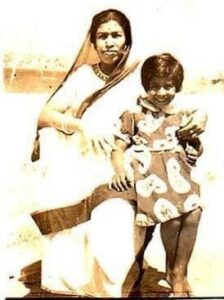 Dadur Ghar was quite historical. We six brothers were born in this house with the Midas touch of ‘Sotor ma’, a sort of midwife. Except our youngest sister Tinku who was born in Patna Medical College. I am not aware of Barda and Dada’s place of birth. I remember the moments before the birth of Bachchu vivdly. We were all huddled downstairs, with not a single male member in the house when, Notun Mashima came and announced “Toder ekta bhai hoeche”. Thus landed our youngest brother, future top cop of Calcutta Police, President of Cricket Association of Bengal, DG, Police Research R &D. May God bless “Sotor Ma!” Now I think our being born in that house were nothing short of miracles!
Dadur Ghar was quite historical. We six brothers were born in this house with the Midas touch of ‘Sotor ma’, a sort of midwife. Except our youngest sister Tinku who was born in Patna Medical College. I am not aware of Barda and Dada’s place of birth. I remember the moments before the birth of Bachchu vivdly. We were all huddled downstairs, with not a single male member in the house when, Notun Mashima came and announced “Toder ekta bhai hoeche”. Thus landed our youngest brother, future top cop of Calcutta Police, President of Cricket Association of Bengal, DG, Police Research R &D. May God bless “Sotor Ma!” Now I think our being born in that house were nothing short of miracles!
Baba was a strict disciplinarian. We had to be back home by 6pm strictly after play. Studying in his presence in the evenings was a great headache. His English was strong and he would immediately catch somebody reading wrongly in pronunciation or spelling. Bhanu (brother) got a taste of good ‘khharam peta’, I recall. For what reason of course, I do not remember.
Years later when I was working, once as we came to Patna from Nagpur or Hyderabad, Baba and Bachchu came to receive us from the Main road. We all started walking home, the rickshaw with Tripti, my wife, and the luggage following us. Baba carrying my older daughter all of three years in his lap was walking and talking to his little grand-daughter. He said to her, “Tumi Ekhon iskule porchho? Ki naam iskuler? Iskul jete bhalo laage?” etc. . Suddenly, she blurted out, “ki takhan theke ‘iskul’ ‘iskul’ bolchho, ‘school’ bolte paarona? Baba fell from his high heaven! Bachchu was amused!
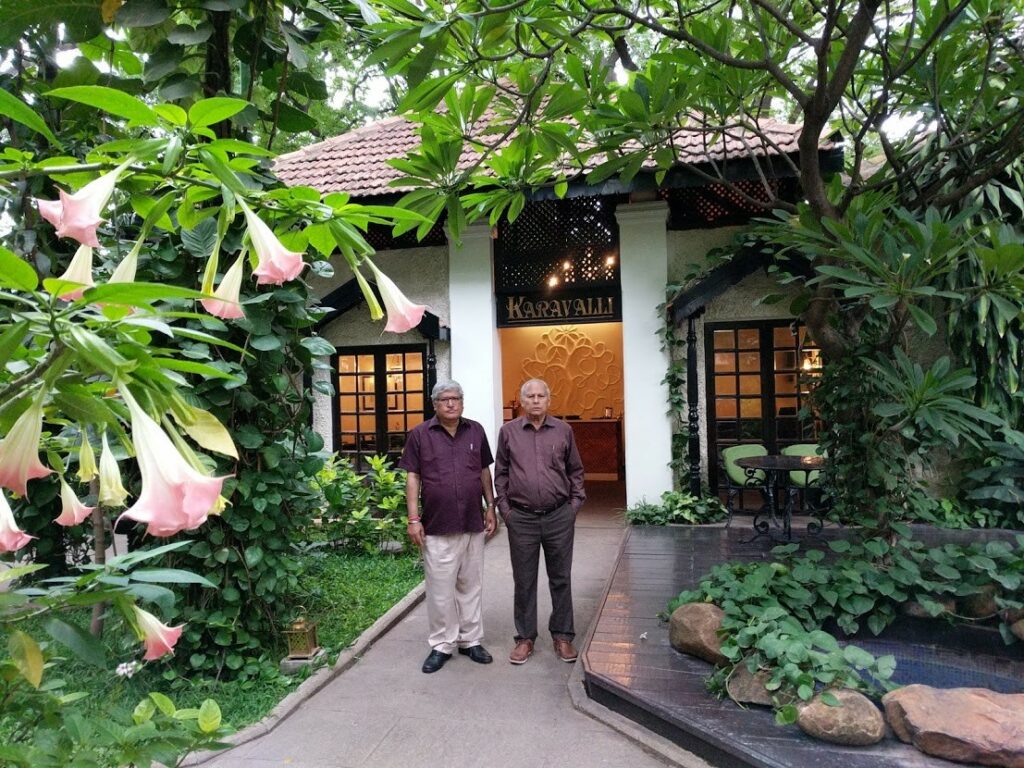
Bara Bairer Ghar was quite special. Barda and Jitendra, his friend, used to study lying down comfortably on the floor. They were preparing for the final medical examination. There was a human skull on the table. Barda would put a cigarette in its mouth sometimes. He liked the ‘Capstan’ brand, which I too liked later. Barda would give me a few rupees and ask to bring a packet from the market, secretly taking care that Ma should know nothing about it! There was no electricity in those days. So studying seriously was difficult, compared to the present days. Barda was a good student. He became an expert surgeon after passing MBBS. Once I asked Tapan(brother) before Barda,”Do you know what is meant by MBBS”? As he could not reply, I said it means “Mia Bibi Bachcha samet”. Barda was thoroughly amused and happy. He did not tug at my ears! Rather enjoyed the mischief. After the marriage of Barda and Boudi a dinner was arranged in the Bara Ghar on Dadu’s famous table. A big kerosene lamp (with a big dome) was in the center. His class mates from Medical College were invited. We enjoyed the festivity.
One afternoon, as I returned from school and entered the Bara Bairer Ghar, I saw a cosy bed ready in the corner. After keeping my bag I threw myself on the bed to feel the pleasure of its warmth , but lo and behold! From the heap of blankets and ‘Lep’ (quilt) came out an astonished soul! Dada. He was having a nice nap there but as man proposes, God disposes. It was a tragedy for him and a shame for me! I felt bad and very sorry.
This was the room where I experienced my first electric shock by design. Hearing that an electric shock throws away a person, I placed “gaddis” all around lest I get hurt. Switching it on, I opened the cover of the switch and touched a wire directly. I felt a heavy electric shock in the whole right arm. I did not fall down of course. Thank God , father knew nothing about the budding scientist. Electric connection came to the house in 1952, when I was in Class IX.
After retirement, our father used to live in this room. There was a big black Almirah in this room. It was full of books. We used to explore these books and gained much knowledge. Sejda developed very good general knowledge from here.
Pisimar Ghar and Bharar Ghar floors were very cold and it was a pleasure to sleep on the floor on hot summer days. Pisima, our aunt, was full of stories. Almost every day we would sit around her and she would tell stories from the Mahabharat, Ramayan, etc. Once she was telling a story from the Mohan series, a detective series. She started – “Mohan was escaping in an air plane. Suddenly there was an accident and the plane landed on a big tree. She stopped for a long time and said ‘chamra’; we could not understand and asked, what happened then. She restarted, there was a big fire in the plane but Mohan managed to jump out and started running towards the village. There was a long pause again. Then she said ‘chamra’ again. “Oh Pisima, what happened to Mohan? And what is this ‘chamra?” Pisima replied ‘O tora bujhbina’. Later on it was discovered, the daughters in law of the house gave her rotis to eat, which were as hard as ‘chamra’(leather)!
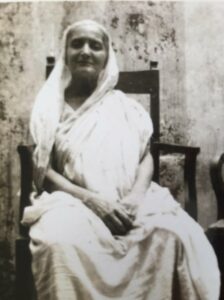 We are indebted to Pisima for our little knowledge gained about the Gods and Goddesses as well as the many mythological stories that we came to know about. We used to accompany her to Harisabha Programmes and enjoyed the soulful kirtans. Thus we developed a taste for divine music. Personally, I started loving Radha and Krishna. They were so beautiful and graceful.
We are indebted to Pisima for our little knowledge gained about the Gods and Goddesses as well as the many mythological stories that we came to know about. We used to accompany her to Harisabha Programmes and enjoyed the soulful kirtans. Thus we developed a taste for divine music. Personally, I started loving Radha and Krishna. They were so beautiful and graceful.
Pujor Ghar below the staircase was a small one where Pisima would perform Puja daily. She would meditate for a long time, when her whole body would bend sideways. Those days, when I was of a small age, I could not understand her puja, but now I know better. She was an enlightened soul and had a good knowledge about the Divine. She used to like us children and was very friendly.
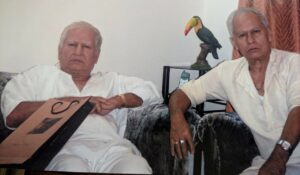 Once Panu was struck with serious smallpox, doctors failed to treat him. I remember a ‘Sadhu’ performed a ‘Puja’ in Pisimar Ghar for his cure for several days with my brother lying on Pisima’s lap for many days for the purpose of the puja. ‘Marai’ our servant brought water from the famous AGAM KUAN well. This is the great well, where Ashoka the Great had thrown the bodies of his brothers after killing them. This well water with medicinal properties is near the PATAN DEVI Shrine, from where Patna gets its name. Panu’s whole body was spotted black but this particular puja and Pisima’s service saved his life.
Once Panu was struck with serious smallpox, doctors failed to treat him. I remember a ‘Sadhu’ performed a ‘Puja’ in Pisimar Ghar for his cure for several days with my brother lying on Pisima’s lap for many days for the purpose of the puja. ‘Marai’ our servant brought water from the famous AGAM KUAN well. This is the great well, where Ashoka the Great had thrown the bodies of his brothers after killing them. This well water with medicinal properties is near the PATAN DEVI Shrine, from where Patna gets its name. Panu’s whole body was spotted black but this particular puja and Pisima’s service saved his life.
Pisima had a tragic life story. On the night of her marriage, her husband had gone missing mysteriously. She waited for him for 12 years, after which declared herself a widow formally, as was the custom. It meant even after marriage she continued to stay in her parents’ house. Pisima had accompanied Dadu while he was posted to Peshawar and Lahore etc. Though she had never been to any school, she learnt Bengali on her own, had read most of the scriptures and was a poetess in her own right. She was a prolific poetess and a few of her poems have been published in Nagpur. She has been a lost genius, mostly misunderstood and an unlucky lady. May God bless her soul. She breathed her last at our home at Shivam Apartment, Nagpur in the year 1989.
Mejo-kaka was a teacher in T.K. Ghosh Academy. He had a B.A. degree. Other than school he used to take tuitions and was a social worker. He was of very shy disposition and would not dare to talk to Baba with eye to eye contact. He would always talk to our father looking at his feet. Mejo-kaka was an essential member of the Burning Ghat Brigade of the Bengali community. Many a times there would be a call for him, ‘Neru Babu Bari Aachehen?’ (Is he home) Father would advise him not to go during the night time. But he would silently slip through the ‘Khirki Darja’. Our father and Mejo-kaka had married into the same family of Monghyr. Their father-in-law was Rai Bahadur Abanindra Nath Banerjee. Our father became the junior doctor, when our uncle became a Civil Surgeon and decided not to work under his brother-in-law and resigned from Bihar Govt. Service. That was the height of his pride!!
Many important persons had visited our house including Zamindar of Goura with his daughter from North Bihar. Others were Pandit Masai from Ranchi and the owner of the Wheeler company chain of Book Shops in Indian Railways. He gave his daughter in marriage to the Mukherjee family.
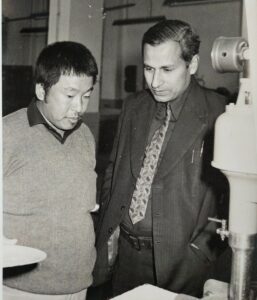 Over the years it was time to disperse to different destinations. Dada had joined LIC and had settled in Rajendra Nagar. Sejda joined Dept. of Explosives. I joined Indian Bureau of Mines. Tapan had joined RBI and had settled in Rajendra Nagar. Pranab had joined FCI Sindri. Bhanu had joined LIC and our youngest brother Bachchu had the distinction of joining the Indian Police Service . Tinku, our sister, was in school when Baba decided to sell the house in 1973 as it was becoming difficult to maintain, at a cost of ₹10,000 only – a mere pittance. The law and order situation in the area also started deteriorating. It appears our family had lived in this house for over 80 years.
Over the years it was time to disperse to different destinations. Dada had joined LIC and had settled in Rajendra Nagar. Sejda joined Dept. of Explosives. I joined Indian Bureau of Mines. Tapan had joined RBI and had settled in Rajendra Nagar. Pranab had joined FCI Sindri. Bhanu had joined LIC and our youngest brother Bachchu had the distinction of joining the Indian Police Service . Tinku, our sister, was in school when Baba decided to sell the house in 1973 as it was becoming difficult to maintain, at a cost of ₹10,000 only – a mere pittance. The law and order situation in the area also started deteriorating. It appears our family had lived in this house for over 80 years.
I remember having seen many a function held in the house. Barda, Dada, Sejda, Tapan, and Panu’s marriages. Of course for my own marriage, I managed to be present! Then there were Papu’s ‘annaprasan’, Sejdas and my joint thread ceremony. Also Tapan and Panu’s thread ceremony.
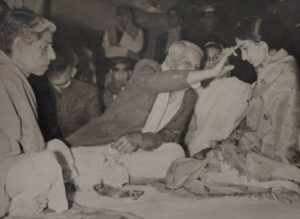 While I was posted at Jammu in I965 Baba sent me a letter advising it was time for my marriage. I had replied that I would like to wait for a while, so that I could have a decent bank balance before marriage! Shortly thereafter came his reply on a post card. It started like this “Param subhashirbad bigyapanagya bises pare Moni babu, tomar chithi pailam. Tomar taka paisa kono diney jomibey na. Tomar bibaha dasai February theek hoiachey, tumi patra paibar matro , Patnar tikit katibar bandobasta karibe.”
While I was posted at Jammu in I965 Baba sent me a letter advising it was time for my marriage. I had replied that I would like to wait for a while, so that I could have a decent bank balance before marriage! Shortly thereafter came his reply on a post card. It started like this “Param subhashirbad bigyapanagya bises pare Moni babu, tomar chithi pailam. Tomar taka paisa kono diney jomibey na. Tomar bibaha dasai February theek hoiachey, tumi patra paibar matro , Patnar tikit katibar bandobasta karibe.”
This roughly transalated to “You will never make much money, so on receipt of this letter please buy your tickets for your marriage at Patna” I sat down helplessly!
I have not written about Sejokaka and Chotokaka, as they were not living in the house permanently. They were only visitors sometimes. So I do not remember much about them except that Sejokaka being the Director of a Bank, would bring packets of brand new coins and place them on the table every month. And Chotokaka was a body builder. He would exercise with a wooden ‘Gada’ on the first floor verandah, where an assortment of exercising equipment was available. He was allergic to chilies and would start jumping whenever Notun masima added chilies in curry. Mother was an expert in cooking. Her speciality was ‘Misti Polau’, ‘Alu posto chops’, ‘Paesh’, ‘Mangsor lamba jhol’ etc.
This is in short the history of the Mukherjee Mansion (a name I fondly gave to the old house), which experienced rise and fall, grandeur and poverty, tragedy and comedy.
Dedication:
To Capt. Dr. Paresh Nath Mukherjee, the darling of the Mukherjee family as well as our mother, Sudharani Mukherjee, of the golden heart, also to our father Dr. Nolin Behari Mukherjee, the Lion of the House. He protected us, purchased and lost the house, and used to say despairingly “Amar ekta cheleo manush holo na.”. “Not one son could become a man!!” Finally dedicated to our grandchildren.
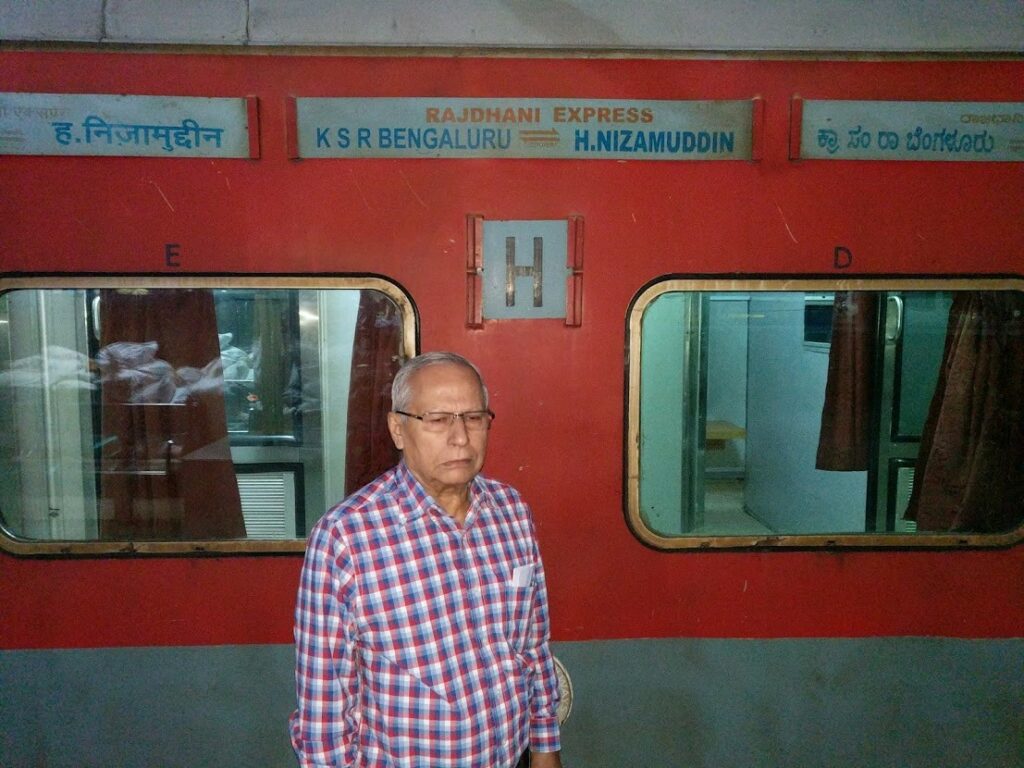
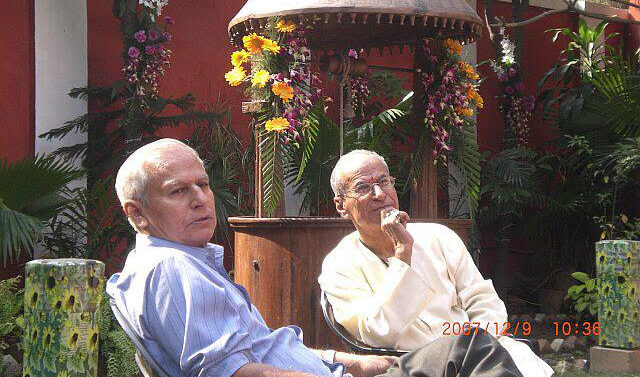
Brilliant stuff.
Brilliant. I would also add that your father-in-law (Dida’s father) was a World War II veteran that went to Singapore, and that we’re always proud of his service.
Such beautiful memories captured in your words. Really enjoyed reading. 🙏🏽🙏🏽
I liked reading 80 years of history of not only an illustrious family, but through the window I could visualize the physical architecture of the mansion, vibrant activities, festivals, special events like birth, marriage, sudden death of a loved one, the feelings of love and fear, roles of each member of the family and their unique life, learnings from elders about our culture and heritage, style of cloth, respect and authority of home service providers, pride of not working in a position junior to a relation, changes during transition from one generation to next, our belief in traditional healing system and many more dimensions of life spanning for nearly a century. Your photograph at the end of the writeup, in front of the train, is symbolic. It is an excellent piece that can be used by students to look back history that we can touch. I am looking forward to a discussion in person. Kind regards. Haribandhu Panda.
Your comments are enlightening!
When I read this, I did not realise this is the history of a century, and the history of many lives, the progress of a vibrant family, the emotions they lived through. Thank you for enriching this.
The train in the end signifies the journey continues!
I wish all family members, including the next generation, write what happens next …
Uncle – enjoyed reading it!!! At first, read a part of it on phone, and then realised that it must enjoyed on a larger screen. It was great learning about four generations of your family. It speaks volumes about values and an all-round exposure in each generation. Why did you also not dedicate it to your siblings, your daughters and sons-in-law? Instead, you jumped two generation to your grandchildren!! Your affection for your elder brother comes out very prominently.
Couldn’t understand the significance of the “Karavali” picture. Was heartening to know that Debjani has been an English teacher from the age of three 😉 The students of Klorofeel School are benefiting from her long years of experience in teaching English. “Mishti Pulao” was mouth watering. In Odisha, there is a dish called “Meetha Khchdi”, which I got reminded of. What is “Mangsor lamba jhol”? Saw “lamba” for the first time in a mutton curry; had seen this before for begun bhaja.
Thank you for your comments.
Here are the clarifications sought by you. ‘Lomba jhol’ of mutton curry was nothing but stew with mutton and potato prepared in plenty of water with light and right masala. It was our favourite dish on Sundays. Our dear mother used to prepare this very well. ……..about the snap in Bangalore, I am standing here with my youngest brother.
Reading it was a lovely experience. In my mind’s eye I could visualize the house & all it’s people & feel all the undercurrents in the various relationships.